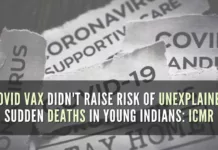
How COVID-19 impacts people with diabetes & associated heart disease
An Indian-origin researcher, Dinender Singla, has revealed that COVID-19 can alter a person’s genetic makeup which can enhance the proliferation of disease and cause further deterioration in diabetes and associated heart disease.
Singla is the Chair of Cardiovascular Science at the College of Medicine at the University of Central Florida.
He believes that the genetic makeup of patients with diabetes or those predisposed to the disease makes them more prone to post-Covid inflammatory conditions that impact the heart and brain.
Some diabetic patients who were infected with COVIDid-19 may have developed a different cellular composition in their blood compared to diabetic patients who never had Covid.
In an article published in the American Journal of Physiology-Heart and Circulatory Physiology, he examined the mechanisms and possible effects of COVID-19 on patients with high-risk diabetes and the virus’ potential to advance the disease, leading to inflammation and heart failure.
“Our thinking is COVID-19 could have three major long-term effects on patients,” Singla said.
First “One is a cognitive dysfunction, which can lead to Alzheimer’s disease. Second, it can enhance diabetes in pre-diabetic patients or pre-diabetic conditions. Third, it can exacerbate complications of diabetes such as cardiomyopathy or muscle dysfunction,” he explained.
The next step in his research is to analyze specific cellular differences in diabetics with and without a Covid infection.
“Our goal is to look into whether there is a difference in blood composition or variations in cytokines — proteins that affect communications between cells — compared to the non-Covid diabetic patients,” Singla said.
“If any differences are noted, then we would need to examine what kind of diseases they could potentially cause or enhance in those patients,” he added.
COVID-19 has affected more than 600 million people worldwide, and because vaccines have made the virus not as alarming today as it was two years ago, Dr. Singla said there are still many unanswered questions about its long-term impact on health.
[With Inputs from IANS]
PGurus is now on Telegram. Click here to join our channel and stay updated with all the latest news and views
For all the latest updates, download PGurus App.
- BSF seizes China-made drone near India-Pakistan border in Amritsar - April 20, 2024
- US enforces sanctions on four companies aiding in Pakistan’s ballistic missile program - April 20, 2024
- India delivers Brahmos missile system to Philippines - April 19, 2024










